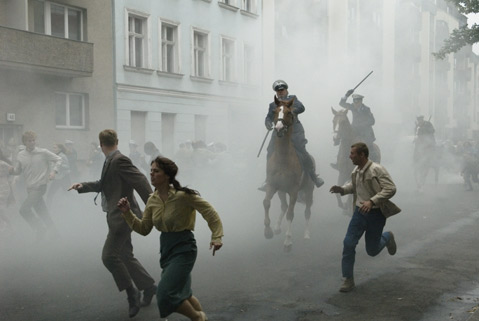The Baader Meinhof Complex
Martina Gedeck and Moritz Bleibtreu Star in a Film Written by Uli Edel and Bernd Eichinger and Directed by Edel

One of the finest films seen at this year’s Santa Barbara International Film Festival, The Baader Meinhof Complex is doubly exotic, as one of the boldest German films of late and as an insight into the country’s recent troubled past. Though little known or remembered on this side of the Atlantic, the Baader Meinhof Gang (aka the Red Army Faction [RAF]) was a notorious and in some ways antiheroic sociopolitical activist group, a generation removed from Nazi terror, whose anti-capitalist doctrines were realized with the aid of guns and bombs. Nowadays, the RAF is viewed as a darker, reality-check aftershock of the blissful naivete of 1960s peaceniks, before a grimmer morning broke in the ’70s.
We may know of the Baader Meinhof saga through once-removed cultural sources, whether as a backdrop in Fassbinder films, or the famed black-and-white paintings of Gerhard Richter. The vivid and carefully nonpartisan portrait we get from Uli Edel’s sharply crafted film is a fascinating chronicle, a view of a good idea gone seriously bad, distorted by the passion of an extremist manifestation and bad judgments made in the name of dogma. Terrorism and violent anarchy by any other name, the film implicitly suggests, is just as sour.
Excellent acting helps the cause here, elevating the film. Martina Gedeck plays the more measured, philosophical, and ultimately bored suburban intellectual Ulrike Meinhof, drawn into what is called “holy self-realization through arson” by the more volatile, action-lustful young revolutionary Andreas Baader, played by Moritz Bleibtreu. The pair has a fiery charismatic lure for the expanding ranks of the group, not to mention inter-sexual magnetism. Edel follows the story and its infamous violent episodes, bank robberies, assassinations, and various narrative twists in the RAF saga, which more or less ended with the sobering horrors of the terrorist actions at the 1972 Munich Olympics.
In other words, the film covers a lot of ground, time, and perspectives, with a surprisingly seamless yet engaging touch. Consider it the evil-twin companion piece to Taking Woodstock.



